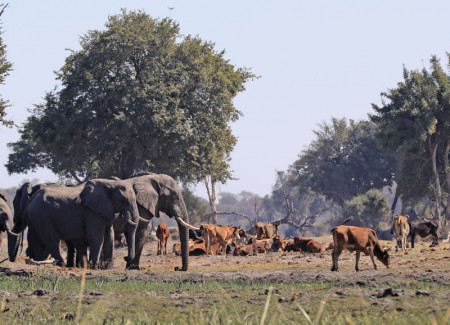CITES is millions of thoughts away from Seronga
Thalefang Charles | Friday August 23, 2019 12:48


Last year the communities around Botswana descended to kgotla meetings to provide their opinions and insights on the management of the thousands of elephants that throng their backgrounds.
In Seronga, on the Okavango eastern panhandle, elephants are not viewed with astonishment and admiration. They are feared. Seronga and many villages along the eastern Okavango panhandle have the worst human-elephant conflict. A number of people have died from being trampled down by elephants, and many farmers lose their crops every season due to elephants.
Kgosi Maeze Maeze of Seronga reports.
“There are many elephants here and they have destroyed the vegetation. Our goats and small wild animals are under threat because there is not enough grass for eating and hiding. They are out of control. The people are not cultivating crops because of the elephants and they now rely on government destitute programmes although they are able and capable of feeding themselves”.
So when the people of Seronga and Batswana elsewhere provided their suggestions on dealing with elephants during the Sub-committee of Cabinet on hunting ban social dialogue, many thought their recommendations will be the means to an end.
But this week, thousands of kilometres away from Botswana, in Geneva, Switzerland in Europe, where there is no single wild elephant, a United Nations (UN) Convention on International Trade in Endangered Species of Wild Fauna and Flora (CITES) 18th meeting of the Conference of the Parties, dubbed CoP18, is underway.
CoP18 will have a great implication to the local rural communities competing for space with the elephants in the rural settlements of Southern Africa.
At CITES, Botswana which is represented by tourism minister Kitso Mokaila and eight other senior government officials, is pushing for two critical proposals both affecting elephants.
There is Proposal 11, in which Botswana, Namibia and Zimbabwe want CITES to amend the existing annotation for the Appendix II listing of elephants in Botswana, Namibia, South Africa and Zimbabwe to allow trade in live elephants and stockpile sales at any date in the future.
Botswana is also backing Zambia’s request to downlist Zambia’s elephants from Appendix I to Appendix II for the purposes of ivory stockpile sales, and exports of hunting trophies, hides and leathers.
However, a group of mostly West African formerly war torn countries are fiercely opposing the move.
Burkina Faso, Côte d’Ivoire, Gabon, Liberia, Niger, Nigeria, Sudan, Syrian Arab Republic and Togo are aggressively fighting for Proposal 12 in which they want the transfer of the elephant populations of Botswana, Namibia, South Africa and Zimbabwe from Appendix II to Appendix I.
If Proposal 12 passes, it would mean that it is back to the drawing boards for Botswana and her SADC counterparts. This means that the livelihoods of thousands of Batswana facing the brunt of high elephant population will be endangered.
SADC Africans, with the greatest amount of elephants, believe that CITES has been deeply infiltrated by Western animal rights groups who do not want to look at the perceptive of Africans living with the elephants. There have even been reports of vote rigging at the convention in favour of the Western countries and animal rights groups.
This week an environmental journalist based in South Africa and currently covering the Cop18 Emmanuel Koro wrote: “If you thought vote rigging was only associated with African presidential elections where the UN always sends well-funded delegates to inspect them; think again. Right here in Geneva, Switzerland at the UN Convention on International Trade in Endangered Species of Wild Fauna and Flora (CITES), Western animal rights groups and some Western countries are buying votes against ivory trade”.
In Botswana, elephant-wildlife conflict has become a human right issue. Many communities on the frontlines with the jumbos are crying that there are too many elephants.
These communities do not see direct tourism benefits of these heavy plant-eating mammals because of deaths of family members caused by elephants, destitution caused by elephants trampling on crops, and government bureaucracy in handling the Western tourism mafia.
Dr. Amanda Stronza, an anthropologist at Ecoexist Project, working with communities in the panhandle area to find solutions to co-exist with elephants, says there must be partnerships with people living with elephants to find solutions to human-elephant conflict and wildlife crime. She said, “If you care about elephants, the best thing is to support the people that live with elephants”.
But looking at the delegates’ voting patterns from the comfort of Geneva’s air-conditioned halls, posh hotels, flight tickets and hefty per diem, CITES is just a million thoughts away from Seronga.
